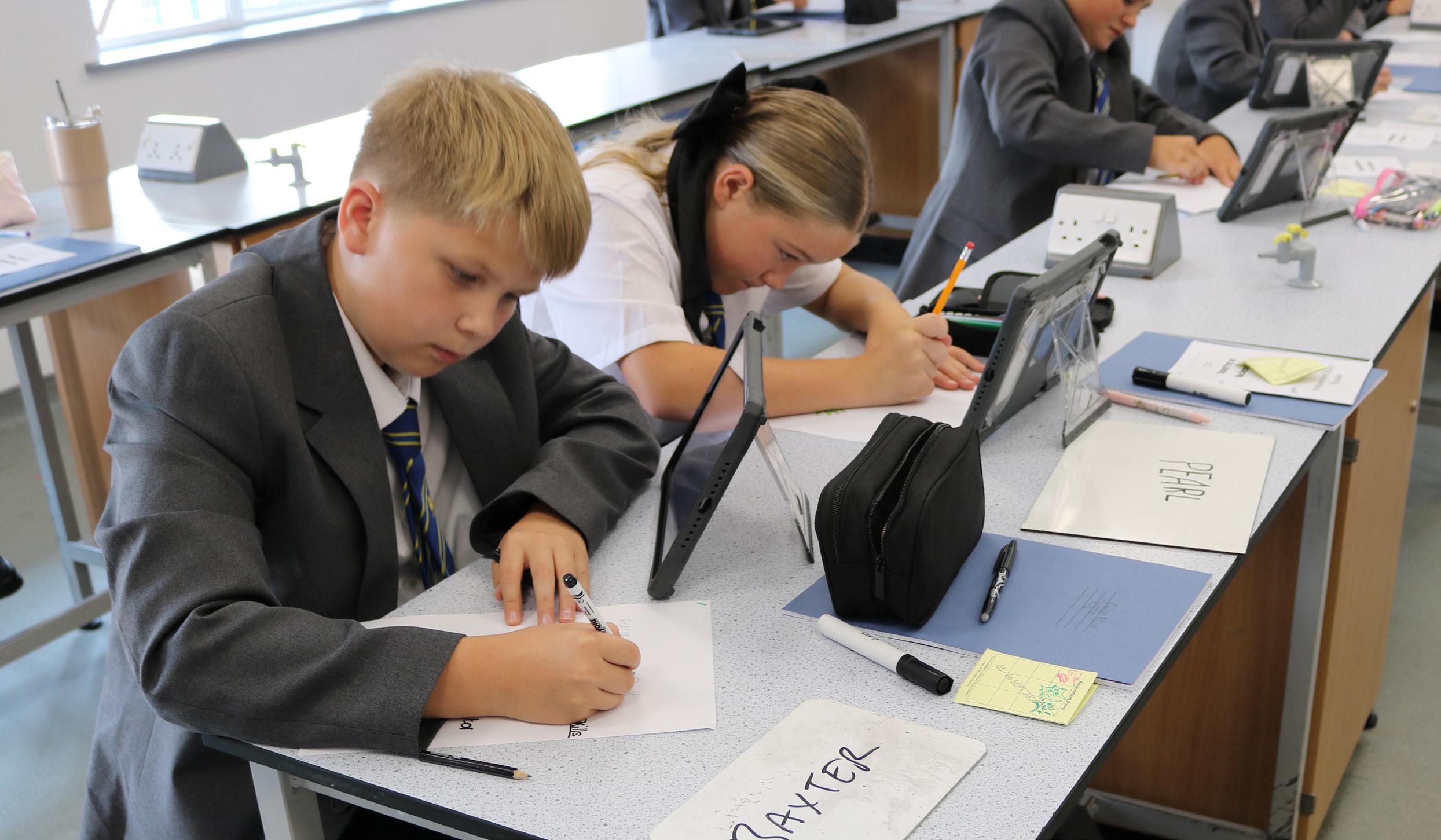

HEADLINES 25th April 2025
By James Saunders
SUCCESS IS 10% INSPIRATION AND 90% PERSPIRATION
As we enter another busy term, it is important to take a moment to reflect on the great achievements and successes that our learners have had this year. We have seen an incredible amount of hard work and dedication from our learners, and we are proud of what they have accomplished over the first two terms. When walking around the school - often accompanied by prospective parents the overwhelming feedback is positive. Parents comment on how quiet it is in school and how focused, happy and polite our learners are. It still remains an absolute pleasure to work at Honywood. Everytime a learner politely says good day to me or asks me how my day is going I feel very proud. My favourite activity is to just hold a door open at lesson changeover time. If I am feeling down the positivity from everyone who walks through the door fills me with immense joy.
We aim for our learners to leave us both happy and successful. At Honywood, we believe that success is not just about talent, but about developing good habits and attitudes. I often have conversations with learners who state they are not good at something. The only way to get good is to develop a strong work ethic and to persevere. It is all too easy in this age of instant gratification to look at someone who is successful and think it just happened overnight. The glossiness of success rarely highlights the grittiness of the journey to achieve it.
There are of course many things that we can all do to help us be successful. Today I would like to highlight ten things that every learner can do to maintain a good work ethic:
1. Be On Time – This shows respect, maturity and responsibility.

2. Work Ethic – Do they spend every day focusing on the right things?
3. Effort – Talking is easy. Doing the work is where accomplishment takes place.
4. Energy – This is the most valuable thing anyone can bring to learning.
5. Body Language – Do learners look like they are ready to learn and engage?
6. Passion – Are they proud of what they are doing?
7. Doing Extra – Putting more than the minimum in - going the extra mile.
8. Being Prepared – Being organised and arriving ready to learn.
9. Being Coachable – Prepared to listen and learn from feedback.
10. Attitude – It’s up to them. It is their life. The attitude will determine the altitude they fly at.
These are all things that we can all achieve. However, they are not things that we can get complacent about. We must maintain a strong work ethic everyday. I had a chat about ‘taking the easy option’ with someone the other day. I pointed out that the world is full of people who take the easy option. If we really want to achieve our dreams and ambitions it does require hard work - they will not just happen in an instant. Cultivating these habits from an early stage really does help later on in life.
By focusing on these ten things, our learners can continue to achieve great things in their academic and personal lives.
I want to take this opportunity to thank all of our learners, parents, and staff for their hard work and dedication this year. I am looking forward to continuing to work together to achieve great things in the summer term.
Have a lovely weekend.

James Saunders
Congratulations to Lilah Dixey (8JVe) who came 2nd in the Cross Country Horse Jumping competition at the Twinstead Riding School over the Easter holidays.





GCSE Exams
Top tips to survive the exam season
Getting ready for exams can bring out many emotions, ranging from excitement to apprehension, and elation to exhaustion. However you feel, these top tips will help you to approach the exams in a positive manner.
1. Manage your time

Don’t leave it until the last minute. It’s widely accepted that this is not the best way to approach an exam. To help sort out your time management, set up a timetable for your study. Write down how many exams you have and the days on which you have to sit them. Then organise your study accordingly. You may want to give some exams more study time than others, so find a balance that you feel comfortable with.
2. Organise your study space

Make sure you have enough space to spread your textbooks and notes out. Have you got enough light? Is your chair comfortable? Are your computer games out of sight? Try and get rid of all distractions, and make sure you feel as comfortable and able to focus as much as possible. For some learners, this may mean almost complete silence, for others, background music helps. Some of us need everything completely tidy and organised in order to concentrate, while others thrive in a more cluttered environment. Think about what works for you, and take the time to get it right.
3. Use flow charts and diagrams

Visual aids can be really helpful when revising. At the start of a topic, challenge yourself to write down everything you already know about a topic - and then highlight where the gaps lie. Closer to the exam, condense your revision notes into onepage diagrams. Getting your ideas down in this brief format can then help you to quickly recall everything you need to know during the exam. Flash cards are useful for learning the relationship between two pieces of information - write a question or key term on the front and then the answer or definition on the back.
4. Practice past papers

One of the most effective ways to prepare for exams is to practice taking past papers. This helps you get used to the format of the questions, and - if you time yourself - can also be good practice for making sure you spend the right amount of time on each section.
5. Organise study groups with friends

Get together with friends for a study session. You may have questions that they have the answers to and vice versa. As long as you make sure you stay focused on the topic for an agreed amount of time, this can be one of the most effective ways to challenge yourself. Explain an answer to a question to them. That will help you to get it clear in your head, and also to highlight any areas where you need more work.
6. Take regular breaks

Studies have shown that for longterm retention of knowledge, taking regular breaks really helps. Everyone’s different, so develop a study routine that works for you. If you study better in the morning, start early before taking a break at lunchtime. Or, if you’re more productive later in the day, take a larger break earlier on so you’re ready to settle down come evening.
Remember that being well hydrated is essential for your brain to work at its best. Make sure you keep drinking plenty of water throughout your revision, and also on the exam day.
7. Get plenty of sleep

Getting enough sleep is vital to feeling and performing your best. A good night of sleep will help you feel more energetic, alert, focused and upbeat.

THE GCSE CONTINGENCY DATE FOR 202 5 IS UP TO AND IN CLUDING 25th JUNE. CANDIDATES WILL BE REQUIRED TO BE AVAILABLE UP TO AND TO INCLUDING THE 25th JUNE IN THE EVENT THAT AN EXAM MAYBE POSTPONED.
IMPORTANT INFORMATION
Dear Parents/Carers
GCSE EXAMINATIONS: Summer 2025
Your son or daughter will now have received the statement of entry for their GCSE exams and the generic timetable is also available on our website. Please note the dates/times and duration of each exam.
If an exam finishes after the school buses have left it is the responsibility of the candidate to make arrangements to travel home.
The conduct of these examinations is very important as the centre is bound by rules issued by the Joint Council for Qualifications. Candidates are aware of the conduct required in the examination room. Candidates are asked to be outside the exam room fifteen minutes before the start of the exam and must have black pens, pencils and any other equipment required for the exam. Candidates have been reminded that equipment should be brought into the exam room in a transparent holder and no calculator lids or glasses cases are permitted. Only water can be bought into the exam hall and needs to be in a transparent bottle with labels removed and no writing/logos.
Mobiles phones, iPods, Watches, MP3 players and any other recording device of this kind must NOT be brought into the exam room. Possession of these items in the exam hall is regarded as malpractice and may result in disqualification.
If a candidate is unwell a medical letter should be obtained. If a large part of the examination requirement has been completed, the Board may consider an assessed grade. If a candidate sits a paper while sick or in distress, the school should be informed. If applicable , a “special consideration” application can be made.
Absence without good cause will result in parents /carers being invoiced for the cost of the examination. The average cost of each subject is approximately £50.
Please contact me if you have any concerns or reason to question a result. There is an agreed procedure to follow. However, the exam boards may make a charge for this service.
Please do not hesitate to contact me if you require any further information or clarification of the above.
Yours sincerely
Mrs Anne-Marie Ketteridge Exams’ Officer
New School Day Timings from September 2025


The October half-term break for the academic year 2025-2026 will take place from Monday 20th October to Friday 31st October 2025 (inclusive).
